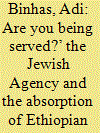| Srl | Item |
| 1 |
ID:
144680


|
|
|
|
|
| Summary/Abstract |
This article addresses the question of how the Israeli government and the Jewish Agency for Israel (JAFI) handled the absorption of Ethiopian immigrants in the early 1990s. It shows that, reflecting the historic rivalry between the two organizations, their interaction lacked a clear division of roles and was mired by rivalry and conflicting interests. As a result, the individual immigrant, besides dealing with predictable absorption difficulties, had to cope with bureaucratic failures.
|
|
|
|
|
|
|
|
|
|
|
|
|
|
|
|
| 2 |
ID:
102494


|
|
|
|
|
| Publication |
2011.
|
| Summary/Abstract |
Regardless of the types of civil conflict settlements, all parties generally enter into some sorts of tacit or direct bargaining in the course of civil conflict, namely, in steps toward peace. In contrast to a basically static framework employed in much of existing literature on civil war settlements and mediation, this article proposes a disaggregate approach to dynamic and multi-phase processes in civil conflict termination via negotiations. We illustrate a conceptual and theoretical framework to examine four steps in civil conflict settlements in a large-N research program. In so doing, we present an initial effort to construct a dyadic dataset isolating processes that allow civil conflict settlements to progress or regress between low and higher levels of agreement in the Asia-Pacific region from 1990 to 2005. We discuss a set of preliminary simple statistical results for the four distinct settlement phases in the context of conflict and rebel characteristics. Among the findings of note, third parties provide important assistance in nurturing successful negotiations especially in the context of waning insurgent strength. Peace proposals originate most frequently from governments, and seem to hinge especially on opponents' battlefield advantages. Evidence of mutually hurting stalemates is also found. In the article's conclusion we elaborate a long-term research agenda.
|
|
|
|
|
|
|
|
|
|
|
|
|
|
|
|